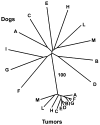Clonal origin and evolution of a transmissible cancer
- PMID: 16901782
- PMCID: PMC2593932
- DOI: 10.1016/j.cell.2006.05.051
Clonal origin and evolution of a transmissible cancer
Abstract
The transmissible agent causing canine transmissible venereal tumor (CTVT) is thought to be the tumor cell itself. To test this hypothesis, we analyzed genetic markers including major histocompatibility (MHC) genes, microsatellites, and mitochondrial DNA (mtDNA) in naturally occurring tumors and matched blood samples. In each case, the tumor is genetically distinct from its host. Moreover, tumors collected from 40 dogs in 5 continents are derived from a single neoplastic clone that has diverged into two subclades. Phylogenetic analyses indicate that CTVT most likely originated from a wolf or an East Asian breed of dog between 200 and 2500 years ago. Although CTVT is highly aneuploid, it has a remarkably stable genotype. During progressive growth, CTVT downmodulates MHC antigen expression. Our findings have implications for understanding genome instability in cancer, natural transplantation of allografts, and the capacity of a somatic cell to evolve into a transmissible parasite.
Figures






Comment in
-
The singular history of a canine transmissible tumor.Cell. 2006 Aug 11;126(3):445-7. doi: 10.1016/j.cell.2006.07.016. Cell. 2006. PMID: 16901777 Review.
-
The evolution of a malignant dog.Evol Dev. 2007 Nov-Dec;9(6):521-2. doi: 10.1111/j.1525-142X.2007.00191.x. Evol Dev. 2007. PMID: 17976047 No abstract available.
References
-
- Affolter VK, Moore PF. Localized and disseminated histiocytic sarcoma of dendritic cell origin in dogs. Vet Pathol. 2002;39:74–83. - PubMed
-
- Ajello P, Gimbo A. Presenza di particelle virali nelle cellule del tumore di Sticker. Atti Soc Ital Sci Nat. 1965;19:736–739.
-
- Banfield WG, Woke PA, Mackay CM, Cooper HL. Mosquito transmission of a reticulum cell sarcoma of hamsters. Science. 1965;148:1239–1240. - PubMed
-
- Barozzi P, Luppi M, Facchetti F, Mecucci C, Alu M, Sarid R, Rasini V, Ravazzini L, Rossi E, Festa S, et al. Post-transplant Kaposi sarcoma originates from the seeding of donor-derived progenitors. Nat Med. 2003;9:554–561. - PubMed
-
- Battistacci M, Morriconi F. Ricerche ultastrutturali sul sarcoma di Sticker. Nuova Vet. 1974;50:226–236.
Publication types
MeSH terms
Substances
Associated data
- Actions
- Actions
- Actions
- Actions
- Actions
- Actions
- Actions
- Actions
- Actions
- Actions
- Actions
- Actions
- Actions
- Actions
- Actions
- Actions
- Actions
- Actions
Grants and funding
LinkOut - more resources
Full Text Sources
Other Literature Sources
Research Materials

